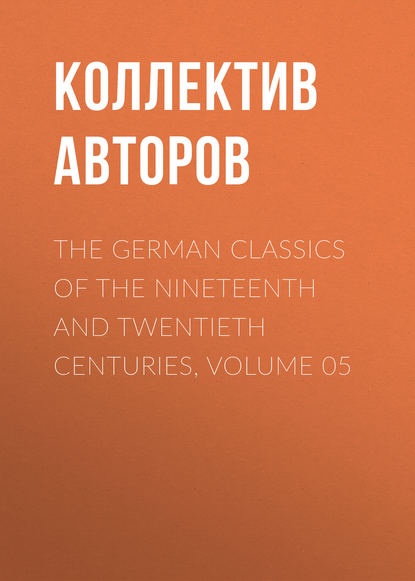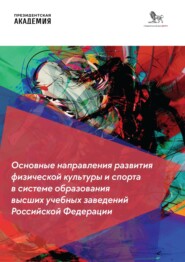По всем вопросам обращайтесь на: info@litportal.ru
(©) 2003-2024.
✖
The German Classics of the Nineteenth and Twentieth Centuries, Volume 05
Настройки чтения
Размер шрифта
Высота строк
Поля
It seemed too as if fortune were on his side, for he had not reached his fastened horse when he distinctly heard Bertalda's plaintive voice not far distant, and could catch her weeping accents through the ever increasing tumult of the thunder and tempest. He hurried swiftly in the direction of the sound, and found the trembling girl just attempting to climb the steep in order to escape in any way from the dreadful gloom of the valley. He stepped, however, lovingly in her path, and, bold and proud as her resolve had been before, she now felt only too keenly the delight that the friend whom she so passionately loved should rescue her from this frightful solitude, and that the joyous life in the castle should be again open to her. She followed almost unresisting, but so exhausted with fatigue that the knight was glad to lead her to his horse, which he now hastily unfastened in order to lift the fair fugitive upon it; and then, cautiously holding the reins, he hoped to proceed through the uncertain shades of the valley.
But the horse had become quite unmanageable from the wild apparition of Kühleborn. Even the knight would have had difficulty in mounting the rearing and snorting animal, but to place the trembling Bertalda on its back was perfectly impossible. They determined therefore to return home on foot. Leading the horse after him by the bridle, the knight supported the tottering girl with his other hand. Bertalda exerted all her strength to pass quickly through the fearful valley, but weariness weighed her down like lead and every limb trembled, partly from the terror she had endured when Kühleborn had pursued her, and partly from her continued alarm at the howling of the storm and the pealing of the thunder through the wooded mountain.
At last she slid from the supporting arm of her protector, and, sinking down on the moss, exclaimed, "Let me lie here, my noble lord; I suffer the punishment due to my folly, and I must now perish here anyhow through weariness and dread."
"No, sweet friend, I will never leave you!" cried Huldbrand, vainly endeavoring to restrain his furious steed; for, worse than before, it now began to foam and rear with excitement, till at last the knight was glad to keep the animal at a sufficient distance from the exhausted maiden to save her from increasing fear. But scarcely had he withdrawn a few paces with the wild steed than she began to call after him in the most pitiful manner, believing that he was really going to leave her in this horrible wilderness. He was utterly at a loss what course to take. Gladly would he have given the excited beast its liberty and have allowed it to rush away into the night and spend its fury, had he not feared that in this narrow defile it might come thundering with its iron-shod hoofs over the very spot where Bertalda lay.
In the midst of this extreme perplexity and distress he heard with delight the sound of a vehicle driving slowly down the stony road behind them. He called out for help, and a man's voice replied, promising assistance, but bidding him have patience; and, soon after, two gray horses appeared through the bushes, and beside them the driver in the white smock of a carter; a great white linen cloth was next visible, covering the goods apparently contained in the wagon. At a loud shout from their master the obedient horses halted. The driver then came toward the knight and helped him restrain his foaming animal. "I see well," said he, "what ails the beast. When I first traveled this way my horses acted no better. The fact is, there is an evil water-spirit haunting the place, and he takes delight in this sort of mischief. But I have learned a charm; if you will let me whisper it in your horse's ear he will stand at once just as quiet as my gray beasts are doing there."
"Try your luck then, only help us quickly!" exclaimed the impatient knight.
The wagoner then drew down the head of the rearing charger close to his own, and whispered something in his ear. In a moment the animal stood still and quiet, and his quick panting and reeking condition were all that remained of his previous unmanageableness. Huldbrand had no time to inquire how all this had been effected. He agreed with the carter that he should take Bertalda on his wagon, where, as the man assured him, there was a quantity of soft cotton bales upon which she could be conveyed to Castle Ringstetten, and the knight was to accompany them on horseback. But the horse appeared too much exhausted by its past fury to be able to carry its master so far, so the Carter persuaded Huldbrand to get into the wagon with Bertalda. The horse could be tethered on behind. "We are going down hill," said he, "and that will make it light for my gray beasts." The knight accepted the offer and entered the wagon with Bertalda; the horse followed patiently behind, and the wagoner, steady and attentive, walked by the side.
In the stillness of the night, as its darkness deepened and the subsiding tempest sounded more and more remote, encouraged by the sense of security and their fortunate escape a confidential conversation arose between Huldbrand and Bertalda. With flattering words he reproached her for her daring flight; she excused herself with humility and emotion, and from every word she said a gleam shone forth which disclosed distinctly to the lover that the beloved was his. The knight felt the sense of her words far more than he regarded their meaning, and it was the sense alone to which he replied. Presently the wagoner suddenly shouted with a loud voice. "Up, my grays, up with your feet, keep together! Remember who you are!" The knight leaned out of the wagon and saw that the horses were stepping into the midst of a foaming stream or were already almost swimming, while the wheels of the wagon were rushing round and gleaming like mill-wheels, and the wagoner had climbed up in front in consequence of the increasing waters.
"What sort of a road is this? It goes into the very middle of the stream," cried Huldbrand to his guide.
"Not at all, sir," returned the other laughing, "it is just the reverse; the stream goes into the very middle of our road. Look round and see how every thing is covered by the water."
The whole valley indeed was suddenly filled with the surging flood, that visibly increased. "It is Kühleborn, the evil water-spirit, who wishes to drown us!" exclaimed the knight. "Have you no charm against him, my friend?"
"I know indeed of one," returned the wagoner, "but I cannot and may not use it until you know who I am."
"Is this a time for riddles?" cried the knight. "The flood is ever rising higher, and what does it matter to me to know who you are?"
"It does matter to you, though," said the wagoner, "for I am Kühleborn." So saying, he thrust his distorted face into the wagon with a grin, but the wagon was a wagon no longer, the horses were not horses—all was transformed to foam and vanished in the hissing waves, and even the wagoner himself, rising as a gigantic billow, drew down the vainly struggling horse beneath the waters, and then, swelling higher and higher, swept over the heads of the floating pair, like some liquid tower, threatening to bury them irrecoverably.
Just then the soft voice of Undine sounded through the uproar, the moon emerged from the clouds, and by its light Undine was seen on the heights above the valley. She rebuked, she threatened the floods below; the menacing tower-like wave vanished, muttering and murmuring, the waters flowed gently away in the moonlight, and, like a white dove, Undine flew down from the height, seized the knight and Bertalda, and bore them with her to a fresh, green, turfy spot on the hill, where with choice refreshing restoratives she dispelled their terrors and weariness; then she assisted Bertalda to mount the white palfrey, on which she had herself ridden here, and thus all three returned to Castle Ringstetten.
CHAPTER XV
The Journey to Vienna
After this last adventure they lived quietly and happily at the castle. The knight more and more clearly perceived the heavenly goodness of his wife, which had been so nobly exhibited by her pursuit and her rescue in the Black Valley, where Kühleborn's power again commenced; Undine herself felt that peace and security which is never lacking to a mind so long as it is distinctly conscious of being on the right path, and, besides, in the newly-awakened love and esteem of her husband many a gleam of hope and joy shone upon her. Bertalda, on the other hand, showed herself grateful, humble, and timid, without regarding her conduct as anything meritorious. Whenever Huldbrand or Undine were about to give her any explanation regarding the covering of the fountain or the adventure in the Black Valley, she would earnestly entreat them to spare her the recital, as she felt too much shame at the recollection of the fountain and too much fear at the remembrance of the Black Valley. She learned therefore nothing further of either; and for what end was such knowledge necessary? Peace and joy had visibly taken up their abode at Castle Ringstetten. They felt secure on this point, and imagined that life could now produce nothing but pleasant flowers and fruits.
In this happy condition of things winter had come and passed away, and spring with its fresh green shoots and its blue sky was gladdening the joyous inmates of the castle. Spring was in harmony with them, and they with spring; what wonder then that its storks and swallows inspired them also with a desire to travel? One day when they were taking a pleasant walk to one of the sources of the Danube, Huldbrand spoke of the magnificence of the noble river, how it widened as it flowed through countries fertilized by its waters, how the charming city of Vienna shone forth on its banks, and how with every step of its course it increased in power and loveliness. "It must be glorious to go down the river as far as Vienna!" exclaimed Bertalda, but immediately relapsing into her present modesty and humility she paused and blushed deeply.
This touched Undine deeply, and with the liveliest desire to give pleasure to her friend she asked, "What hinders us from starting on the little voyage?" Bertalda exhibited the greatest delight, and both she and Undine began at once to picture in the brightest colors the tour of the Danube. Huldbrand also gladly agreed to the prospect; only he once whispered anxiously in Undine's ear, "But Kühleborn becomes possessed of his power again out there!"
"Let him come," she replied with a smile; "I shall be there, and he ventures upon none of his mischief before me." The last impediment was thus removed; they prepared for the journey, and soon after set out upon it with fresh spirits and the brightest hopes.
But wonder not, O man, if events always turn out different from what we have intended! That malicious power, lurking for our destruction, gladly lulls its chosen victim to sleep with sweet songs and golden fairy tales; while on the other hand the rescuing messenger from Heaven often knocks sharply and alarmingly at our door.
During the first few days of their voyage down the Danube they were extremely happy. Everything grew more and more beautiful, as they sailed further and further down the proudly flowing stream. But in a region, otherwise so pleasant, and in the enjoyment of which they had promised themselves the purest delight, the ungovernable Kühleborn began, undisguisedly, to exhibit his power, which started again at this point. This was indeed manifested in mere teasing tricks, for Undine often rebuked the agitated waves or the contrary winds, and then the violence of the enemy would be immediately submissive; but again the attacks would be renewed, and again Undine's reproofs would become necessary, so that the pleasure of the little party was completely destroyed. The boatmen too were continually whispering to one another in dismay and looking with distrust at the three strangers whose servants even began more and more to forebode something uncanny and to watch their masters with suspicious glances. Huldbrand often said to himself, "This comes from like not being linked with like, from a man uniting himself with a mermaid!" Excusing himself, as we all love to do, he would often think indeed as he said this, "I did not really know that she was a sea-maiden. Mine is the misfortune that every step I take is disturbed and haunted by the wild caprices of her race; but mine is not the guilt." By such thoughts as these he felt himself in some measure strengthened, but, on the other hand, he felt increasing ill-humor and almost animosity toward Undine. He would look at her with an expression of anger, the meaning of which the poor wife understood well. Wearied with this exhibition of displeasure and exhausted by the constant effort to frustrate Kühleborn's artifices, she sank one evening into a deep slumber, rocked soothingly by the softly gliding bark.
Scarcely, however, had she closed her eyes when every one in the vessel imagined he saw, in whatever direction he turned, a most horrible human head; it rose out of the waves, not like that of a person swimming, but perfectly perpendicular as if invisibly supported upright on the watery surface and floating along in the same course with the bark. Each wanted to point out to the other the cause of his alarm, but each found the same expression of horror depicted on the face of his neighbor, only that his hands and eyes were directed to a different point where the monster, half laughing and half threatening, rose before him. When, however, they all wished to make one another understand what each saw, and all were crying out, "Look there—! No—there!" the horrible heads all appeared simultaneously to their view, and the whole river around the vessel swarmed with the most hideous apparitions. The universal cry raised at the sight awoke Undine. As she opened her eyes the wild crowd of distorted visages disappeared. But Huldbrand was indignant at such unsightly jugglery. He would have burst forth in uncontrolled imprecations had not Undine said to him with a humble manner and a softly imploring tone, "For God's sake, my husband, we are on the water; do not be angry with me now." The knight was silent, and sat down absorbed in reverie. Undine whispered in his ear, "Would it not be better, my love, if we gave up this foolish journey and returned to Castle Ringstetten in peace?"
But Huldbrand murmured moodily, "So I must be a prisoner in my own castle and be able to breathe only so long as the fountain is closed! I would your mad kindred—" Undine lovingly pressed her fair hand upon his lips. He paused, pondering in silence over much that Undine had before said to him.
Bertalda had meanwhile given herself up to a variety of strange thoughts. She knew a good deal of Undine's origin, and yet not the whole, and the fearful Kühleborn especially had remained to her a terrible but wholly unrevealed mystery. She had indeed never even heard his name. Musing on these strange things, she unclasped, scarcely conscious of the act; a gold necklace, which Huldbrand had lately purchased for her of a traveling trader; half dreamingly she drew it along the surface of the water, enjoying the light glimmer it cast upon the evening-tinted stream. Suddenly a huge hand was stretched out of the Danube, seizing the necklace and vanishing with it beneath the waters. Bertalda screamed aloud, and a scornful laugh resounded from the depths of the stream. The knight could now restrain his anger no longer. Starting up, he inveighed against the river; he cursed all who ventured to intrude upon his family and his life, and challenged them, be they spirits or sirens, to show themselves before his avenging sword.
Bertalda wept meanwhile for her lost ornament, which was so precious to her, and her tears added fuel to the flame of the knight's anger, while Undine held her hand over the side of the vessel, dipping it into the water, softly murmuring to herself, and only now and then interrupting her strange mysterious whisper, as she entreated her husband, "My dearly loved one, do not scold me here; reprove others if you will, but not me here. You know why!" And indeed, he restrained the words of anger that were trembling on his tongue.
Presently in her wet hand which she had been holding under the waves she brought up a beautiful coral necklace of so much brilliancy that the eyes of all were dazzled by it. "Take this," said she, holding it out kindly to Bertalda; "I have ordered this to be brought for you as a compensation, and don't be grieved any more, my poor child."
But the knight sprang between them. He tore the beautiful ornament from Undine's hand, hurled it again into the river, exclaiming in passionate rage, "Have you then still a connection with them? In the name of all the witches, remain among them with your presents and leave us mortals in peace, you sorceress!" Poor Undine gazed at him with fixed but tearful eyes, her hand still stretched out as when she had offered her beautiful present so lovingly to Bertalda. She then began to weep more and more violently, like a dear innocent child, bitterly afflicted. At last, wearied out, she said: "Alas, sweet friend, alas! farewell! They shall do you no harm; only remain true, so that I may be able to keep them from you. I must, alas, go away; I must go hence at this early stage of life. Oh woe, woe! What have you done! Oh woe, woe!"
She vanished over the side of the vessel. Whether she plunged into the stream or flowed away with it, they knew not; her disappearance was like both and neither. Soon, however, she was completely lost sight of in the Danube; only a few little waves kept whispering, as if sobbing, round the boat, and they almost seemed to be saying: "Oh woe, woe! Oh, remain true! Oh, woe!"
Huldbrand lay on the deck of the vessel, bathed in hot tears, and a deep swoon presently cast its veil of forgetfulness over the unhappy man.
WILHELM HAUFF
* * * * *
CAVALRYMAN'S MORNING SONG[47 - Translator: Herman Montagu Donner.] (1826)
Crimson morn,
Shalt thou light me o'er Death's bourn?
Soon will ring the trumpet's call;
Then may I be marked to fall,
I and many a comrade brave!
Scarce enjoyed,
Pleasure drops into the void.
Yesterday on champing stallion;
Picked today for Death's battalion;
Couched tomorrow in the grave!
Ah! how soon
Fleeth grace and beauty's noon!
Hast thou pride in cheeks aglow,
Whereon cream and carmine flow?
Ah! the loveliest rose turns sere!
Therefore still
I respond to God's high will.
To the last stern fight I'll fit me;
If to Death I must submit me,
Dies a dauntless cavalier!
* * * * *
THE SENTINEL[48 - Translator: John Oxenford. From Representative German Poems, Henry Holt & Co., New York.] (1827)
Lonely at night my watch I keep,
While all the world is hush'd in sleep.
Then tow'rd my home my thoughts will rove;
I think upon my distant love.

















